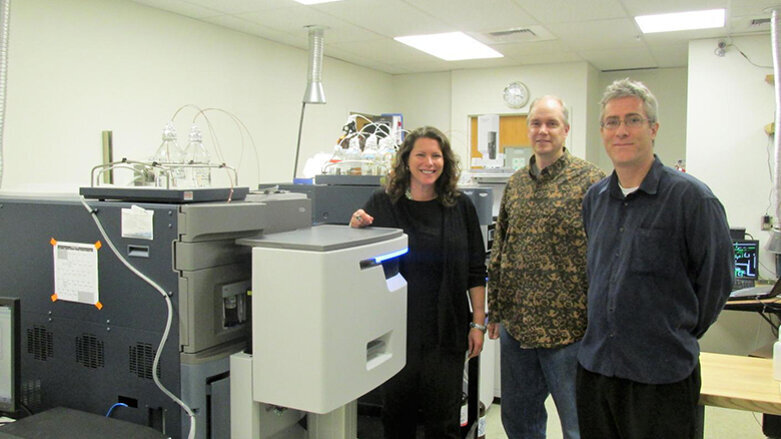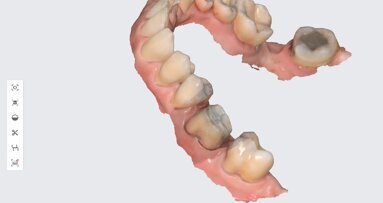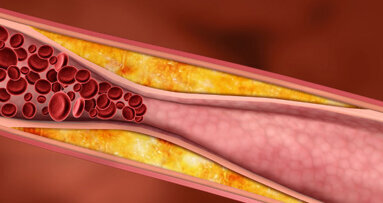WASHINGTON, U.S.: The use of tobacco has forever been etched in human history. Now, for the first time, researchers in the U.S. have shown that nicotine residue can be extracted from calculus on the teeth of tobacco users hundreds, if not thousands, of years later. The discovery provides new insights into the ancient world, while opening up many new possibilities for further research.
By using modern and highly sensitive instrumentation, such as liquid chromatography-mass spectrometry, the scientists have found they can detect and characterize trace amounts of a wide variety of compounds, including proteins, bacterial DNA, starch grains and other plant fibers in dental calculus. This breathes new life into research, as dental calculus had been largely ignored by archaeologists in the past.
“The ability to identify nicotine and other plant-based drugs in ancient dental plaque could help us answer longstanding questions about the consumption of intoxicants by ancient humans,” said co-author of the study Dr. Shannon Tushingham, Assistant Professor of Anthropology at Washington State University (WSU).
As part of the research, the scientists, from WSU and the University of California (UC), collaborated with members of the Ohlone tribe in San Francisco Bay to extract calculus from the teeth of eight individuals buried between 6,000 and 300 years ago. Samples were analyzed for nicotine, caffeine, atropine (a muscle relaxant) and other plant-based drugs.
Among the analyzed samples, two tested positive for nicotine, demonstrating for the first time that the drug can survive in detectable amounts in ancient plaque. One test sample came from an older man who had been buried with his pipe; however, the researchers were surprised by the molar of an older woman testing positive for nicotine.
“While we can’t make any broad conclusions with this single case, her age, sex, and use of tobacco is intriguing,” said lead author Prof. Jelmer Eerkens, an anthropologist at UC. “She was probably past child-bearing age, and likely a grandmother. This supports recent research suggesting that younger adult women in traditional societies avoid plant toxins like nicotine to protect infants from harmful biochemicals, but that older women can consume these intoxicants as needed or desired.”
While the researchers did not detect evidence of any other plant-based drugs in this particular study, they believe dental calculus could be used to help trace the use and spread of other intoxicants.
The study, titled “Dental calculus as a source of ancient alkaloids: Detection of nicotine by LC-MS in calculus samples from the Americas,” was published in the April 2018 issue of the Journal of Archaeological Science: Reports.
Tags:
COPENHAGEN, Denmark: Though its popularity and constituent ingredients have changed over time, chewing gum has been used by humans for thousands of years. A...
YORK, UK: Perhaps unfairly, the teeth of Britons have developed an international reputation for being crooked and aesthetically subpar. Researchers have ...
YORK, UK: In new research, scientists have discovered that the diet of Mesolithic humans was much closer to the contemporary Mediterranean diet than first ...
3D printing has revolutionised modern dentistry, offering a cost-effective, versatile and efficient alternative to traditional fabrication methods. However,...
DALLAS, US: Researchers at The University of Texas at Dallas have introduced a novel approach to ceramic 3D printing that could streamline the production of...
Less than ten years ago, part of my daily routine as a dental student was changing the fixer and developer solutions in the radiograph processor for the ...
Are you a dental professional seeking to enhance your skills in implantology? You are invited to attend an enlightening webinar, titled “Therapy ...
DUBLIN, Ireland: Oral bacteria that escape into the bloodstream are able to cause blood clots and trigger life-threatening endocarditis, researchers from ...
Swiss oral health company CURADEN has launched CURAPROX Perio Plus at IDS 2019. This pioneering antiseptic range is chlorhexidine, but not as you know ...
The rapid rise of digital dentistry has given dentists worldwide many benefits, but it has also increased risks. Dental teams must learn to leverage these ...
Live webinar
Tue. 3 March 2026
11:00 am EST (New York)
Dr. Omar Lugo Cirujano Maxilofacial
Live webinar
Tue. 3 March 2026
8:00 pm EST (New York)
Dr. Vasiliki Maseli DDS, MS, EdM
Live webinar
Wed. 4 March 2026
12:00 pm EST (New York)
Munther Sulieman LDS RCS (Eng) BDS (Lond) MSc PhD
Live webinar
Wed. 4 March 2026
1:00 pm EST (New York)
Live webinar
Fri. 6 March 2026
3:00 am EST (New York)
Live webinar
Tue. 10 March 2026
4:00 am EST (New York)
Assoc. Prof. Aaron Davis, Prof. Sarah Baker
Live webinar
Tue. 10 March 2026
8:00 pm EST (New York)
Dr. Vasiliki Maseli DDS, MS, EdM



 Austria / Österreich
Austria / Österreich
 Bosnia and Herzegovina / Босна и Херцеговина
Bosnia and Herzegovina / Босна и Херцеговина
 Bulgaria / България
Bulgaria / България
 Croatia / Hrvatska
Croatia / Hrvatska
 Czech Republic & Slovakia / Česká republika & Slovensko
Czech Republic & Slovakia / Česká republika & Slovensko
 France / France
France / France
 Germany / Deutschland
Germany / Deutschland
 Greece / ΕΛΛΑΔΑ
Greece / ΕΛΛΑΔΑ
 Hungary / Hungary
Hungary / Hungary
 Italy / Italia
Italy / Italia
 Netherlands / Nederland
Netherlands / Nederland
 Nordic / Nordic
Nordic / Nordic
 Poland / Polska
Poland / Polska
 Portugal / Portugal
Portugal / Portugal
 Romania & Moldova / România & Moldova
Romania & Moldova / România & Moldova
 Slovenia / Slovenija
Slovenia / Slovenija
 Serbia & Montenegro / Србија и Црна Гора
Serbia & Montenegro / Србија и Црна Гора
 Spain / España
Spain / España
 Switzerland / Schweiz
Switzerland / Schweiz
 Turkey / Türkiye
Turkey / Türkiye
 UK & Ireland / UK & Ireland
UK & Ireland / UK & Ireland
 Brazil / Brasil
Brazil / Brasil
 Canada / Canada
Canada / Canada
 Latin America / Latinoamérica
Latin America / Latinoamérica
 USA / USA
USA / USA
 China / 中国
China / 中国
 India / भारत गणराज्य
India / भारत गणराज्य
 Pakistan / Pākistān
Pakistan / Pākistān
 Vietnam / Việt Nam
Vietnam / Việt Nam
 ASEAN / ASEAN
ASEAN / ASEAN
 Israel / מְדִינַת יִשְׂרָאֵל
Israel / מְדִינַת יִשְׂרָאֵל
 Algeria, Morocco & Tunisia / الجزائر والمغرب وتونس
Algeria, Morocco & Tunisia / الجزائر والمغرب وتونس
 Middle East / Middle East
Middle East / Middle East











































To post a reply please login or register